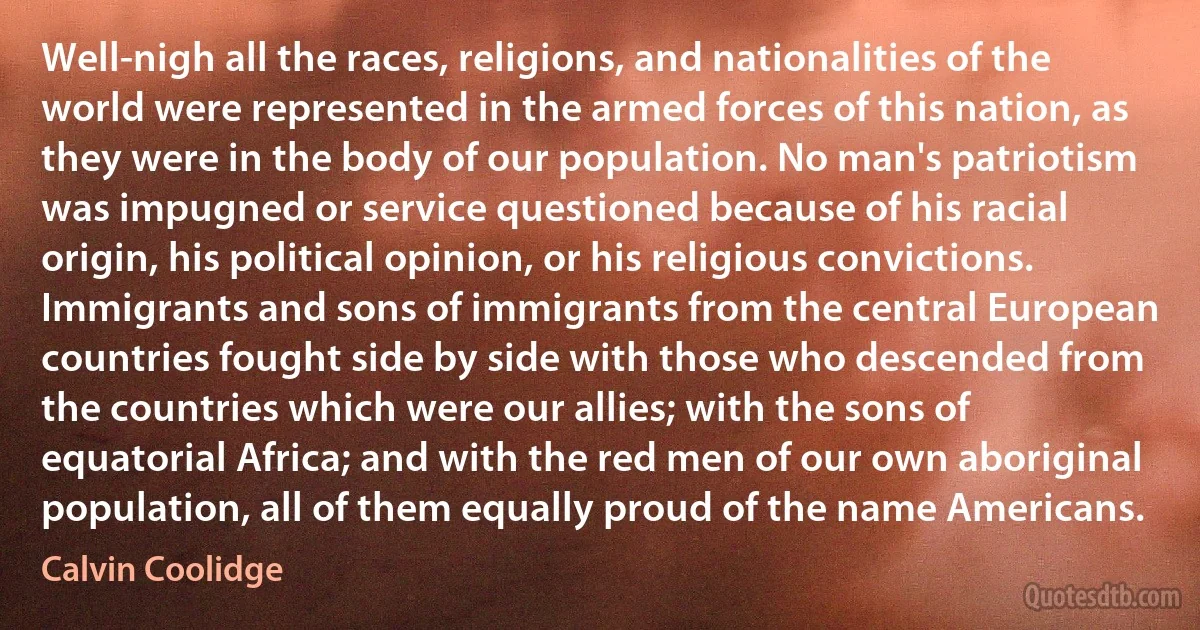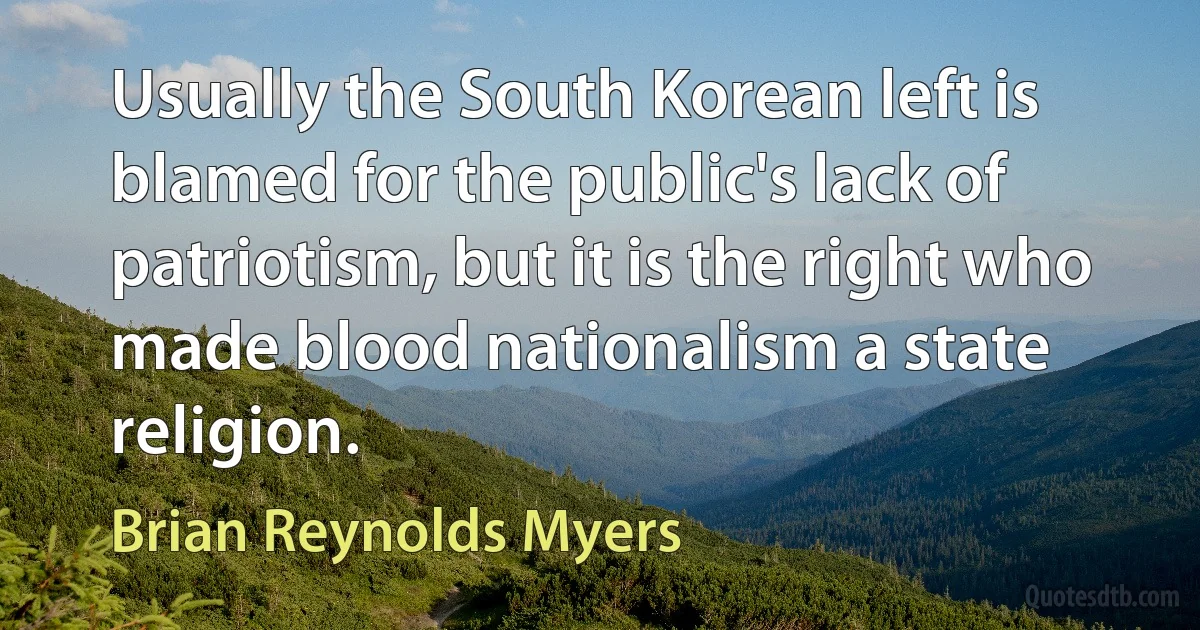Patriotism Quotes - page 16
No part of the community responded more willingly, more generously, more unqualifiedly, to the demand for special extraordinary exertion, than did the members of the Negro race. Whether in the military service, or in the vast mobilization of industrial resources which the war required, the Negro did his part precisely as did the white man. He drew no color line when patriotism made its call upon him. He gave precisely as his white fellow citizens gave, to the limit of resources and abilities, to help the general cause. Thus the American Negro established his right to the gratitude and appreciation which the Nation has been glad to accord.

Calvin Coolidge
The propaganda of prejudice and hatred which sought to keep the colored men from supporting the national cause completely failed. The black man showed himself the same kind of citizen, moved by the same kind of patriotism, as the white man. They were tempted, but not one betrayed his country.

Calvin Coolidge
If we are to have that harmony and tranquility, that union of spirit which is the foundation of real national genius and national progress, we must all realize that there are true Americans who did not happen to be born in our section of the country, who do not attend our place of religious worship, who are not of our racial stock, or who are not proficient in our language. If we are to create on this continent a free Republic and an enlightened civilization that will be capable of reflecting the true greatness and glory of mankind, it will be necessary to regard these differences as accidental and unessential. We shall have to look beyond the outward manifestations of race and creed. Divine Providence has not bestowed upon any race a monopoly of patriotism and character. The same principle that it is necessary to apply to the attitude of mind among our own people it is also necessary to apply to the attitude of mind among the different nations.

Calvin Coolidge
Having now finished the observations on this, probably, the last occasion I shall have of communicating with you, all me to express the hope, that whatever errors I may have committed, will be attributed to no want of zeal in the discharge of my official duties, and that they may find a correction in the intelligence and patriotism, of the gentleman who will succeed me. And in my retirement, whatever may be my lot, I shall not cease to invoke that Beneficent Being, to whose providence we are so signally indebted for the general prosperity of the Territory; for the continuance of his blessings upon Oregon-upon you-and upon your constituents, from whom I have received uniform kindness and support in the discharge of my duties.

Joseph Lane
If government, or those in positions of power and authority, can silence criticism by the argument that such criticism might be misunderstood somewhere, there is an end to all criticism, and perhaps an end to our kind of political system. For men in authority will always think that criticism of their policies is dangerous. They will always equate their policies with patriotism, and find criticism subversive.

Henry Steele Commager
If such a patriotism as we have last considered should seem likely to obtain in any country, it should be certainly in this. In this, which is truly the home of all nations, and in the veins of whose citizens flows the blood of every people on the globe. Patriotism, in the exclusive meaning, is surely not made for America. Mischievous every where, it were here both mischievous and absurd. The very origin of the people is opposed to it.

Frances Wright
Since the political struggles of France, Italy, Spain, and Greece, the word patriotism has been employed, throughout continental Europe, to express a love of the public good; a preference for the interests of the many to those of the few; a desire for the emancipation of the human race from the thrall of despotism, religious and of the human race from the thrall of despotism, religious and civil; in short, patriotism there is used rather to express the interest felt in the human race in general, than that felt for any country, or inhabitants of a country, in particular. And patriot, in like manner, is employed to signify a lover of human liberty and human improvement, rather than a mere lover of the country in which he lives, or the tribe to which he belongs. Used in this sense, patriotism is a virtue, and a patriot a virtuous man.

Frances Wright
The old lady Felderal had long railed at the emperor for not declaring war. She pretended that he feared to call on his subjects for the requisite means, lest their avarice, stronger than their patriotism, should depose him. When, however, war was declared, and the emperor's forces were victorious, she became enamoured of peace, and maintained that a moral and religious people ought not to rejoice at victories purchased by the sacrifice of human life. She invented a song, whose burden was "the golden days of commercial prosperity," and she organized a peace society, whose tenets compelled the members not to fight even an invading army. Finally, as these expedients failed to destroy the emperor, she collected the most desperate of her adherents, to concert means for tying his hands behind his back, "peaceably if they could, forcibly if they must," and delivering him to the king of Glanden.

Alexander Bryan Johnson
[R]elative lack of popularity is not as important as the lack of popularity of a president in South Korea, where there is no bedrock state support to keep people patriotic even when they dislike a leader. But we Americans are more like the North Koreans in that regard. Does our patriotism rise and fall depending on who is in the White House? If we don't like a president, do we start finding America's enemies more likeable? No. We should therefore not assume that Kim Jong Un's relative lack of stature means that support for the state is weakening.

Brian Reynolds Myers
We Anglophones tend to use the words nation and state more or less interchangeably, but when one nation is divided into two states, it's important to stick to the Koreans' own practice of distinguishing clearly between nationalism (minjokjuŭi) and patriotism / state spirit (aeguksim, kukka chŏngsin, kukkajuŭi, etc). Historians do this even in English when discussing the Weimar Republic, where nationalism undermined support for the state - and for liberal democracy - just as it does in South Korea today.

Brian Reynolds Myers
Let us face the inevitable truth. There can be no Americanization from the top down or in the mass. It will not come from the court that grants a citizenship certificate; nor from the school that teaches English; nor from the speakers that talk patriotism; nor from the patriotic society that prints platitudes. It will come from basic conditions being right, and none is more vital than industrial relations. It will live as we shorten the distance between the Constitution and the shop. It will be believed in as we square every act in the shops of America with every utterance in public print.

Frances Kellor

![We do not worship Iran, we worship Allah. For patriotism is another name for paganism. I say let this land [Iran] burn. I say let this land go up in smoke, provided Islam emerges triumphant in the rest of the world. (Ruhollah Khomeini)](https://cdn.quotesdtb.com/img/quotes_images_webp/18/ruhollah-khomeini-allah-burn-528618.webp)

